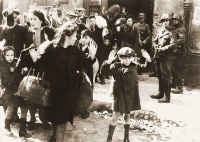No poetry after Auschwitz
From The Art and Popular Culture Encyclopedia
(Difference between revisions)
| Revision as of 10:22, 30 April 2015 Jahsonic (Talk | contribs) ← Previous diff |
Revision as of 10:26, 30 April 2015 Jahsonic (Talk | contribs) Next diff → |
||
| Line 1: | Line 1: | ||
| [[Image:A Child at Gunpoint of the Stroop Report.jpg |thumb|right|200px|''[[A Child at Gunpoint]]'' ([[1943]]) from the ''[[Stroop Report]]'']] | [[Image:A Child at Gunpoint of the Stroop Report.jpg |thumb|right|200px|''[[A Child at Gunpoint]]'' ([[1943]]) from the ''[[Stroop Report]]'']] | ||
| {{Template}} | {{Template}} | ||
| - | "'''Writing poetry after Auschwitz is barbaric'''" or "'''no poetry after Auschwitz''' is an oft-quoted dictum by the [[German philosopher]] [[Theodor W. Adorno]], first published in ''[[Cultural Criticism and Society]]'' in [[1951]]. | + | "'''Writing poetry after Auschwitz is barbaric'''" or "'''no poetry after Auschwitz''' is an oft-quoted dictum by the German philosopher [[Theodor Adorno]], first published in ''[[Cultural Criticism and Society]]'' in [[1951]]. |
| :"Writing poetry after Auschwitz is barbaric." [“Kulturkritik findet sich der letzten Stufe der Dialektik von Kultur und Barbarei gegenüber: nach Auschwitz ein Gedicht zu schreiben, ist barbarisch, und das frißt auch die Erkenntnis an, die ausspricht, warum es unmöglich ward, heute Gedichte zu schreiben.”] | :"Writing poetry after Auschwitz is barbaric." [“Kulturkritik findet sich der letzten Stufe der Dialektik von Kultur und Barbarei gegenüber: nach Auschwitz ein Gedicht zu schreiben, ist barbarisch, und das frißt auch die Erkenntnis an, die ausspricht, warum es unmöglich ward, heute Gedichte zu schreiben.”] | ||
Revision as of 10:26, 30 April 2015
|
Related e |
|
Featured: |
"Writing poetry after Auschwitz is barbaric" or "no poetry after Auschwitz is an oft-quoted dictum by the German philosopher Theodor Adorno, first published in Cultural Criticism and Society in 1951.
- "Writing poetry after Auschwitz is barbaric." [“Kulturkritik findet sich der letzten Stufe der Dialektik von Kultur und Barbarei gegenüber: nach Auschwitz ein Gedicht zu schreiben, ist barbarisch, und das frißt auch die Erkenntnis an, die ausspricht, warum es unmöglich ward, heute Gedichte zu schreiben.”]
The quote is more famously known in the form of the dictum "No poetry after Auschwitz," or "There can be no poetry after Auschwitz." Sometimes a more specific proscription is made, such as "No lyric poetry after Auschwitz." The influence of the underlying idea can be seen in such derivative statements as "No history after Auschwitz" and "Ironic humor is no longer possible after 9/11."
See also
Unless indicated otherwise, the text in this article is either based on Wikipedia article "No poetry after Auschwitz" or another language Wikipedia page thereof used under the terms of the GNU Free Documentation License; or on research by Jahsonic and friends. See Art and Popular Culture's copyright notice.


